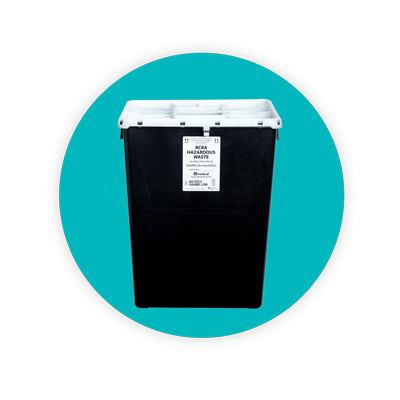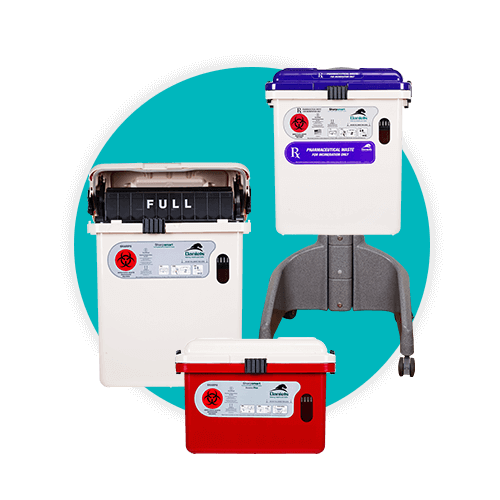Guide to Tennessee Medical Waste Regulations

Do you work in any shape or form within the healthcare industry in the Volunteer State? If you or your facility generate any kind of medical waste in the services of your healthcare business, company, or corporation, you must follow the governing laws and regulations of the state of Tennessee in regard to medical waste.
Regulatory agencies involved in healthcare waste management include the Tennessee Department of Environmental Conservation (TDEC) – Division of Solid Waste Management, as well as the rules and regulations of the US Environmental Protection Agency (EPA).
Where do you find the rules and regulations for Tennessee?
Under the rules and regulations of the state of Tennessee 0400-11-01-.01 you’ll find guidelines for medical waste/solid waste disposal.
You’ll also find a number of chapters under these regulations, starting off with definitions and then rules regarding approval for disposal, certifications, recertification, fees, variances, and waivers. Guidelines specific to medical waste management are found under rule 0400-11-01-.04 (2)(k)(4).
This document titled “Rules of Tennessee Department of Environment and Conservation Solid Waste Management” is approximately 143 pages long. That’s not very long compared to some other states, but one of the most important portions of the document is found under definitions.
You must be aware of Tennessee’s definitions of hazardous wastes –which are found in subparagraph (1)(c) of Rule 0400-12-01-.02. This is the point when a number of facilities that generate medical waste cross their eyes and say forget it. Having to jump from rule to rule just to search out a definition is not only time-consuming but frustrating.
We get it. However, we can’t emphasize the importance of taking the time to do so. We’re familiar with digging through pages, paragraphs, sub-paragraphs, and sub-sections defining the most recent rules and regulations in state guidelines for biohazard waste disposal, chemotherapy waste, infectious waste, surgical waste, and more. We know the importance of waste segregation, knowing how to identify one waste stream from another, and waste audit procedures to help companies, hospitals, outpatient centers, or even tattoo parlors remain compliant.
Getting back to the regulations, , seeking information regarding Tennessee’s handling of hazardous wastes will eventually take searchers to the Division of Solid Waste Management – Hazardous Waste Program. Like the previous document found under the rules and regulations of the state of Tennessee, the chapter regarding hazardous waste management (Chapter 0400-12-01) is even longer, heading toward the 300 page mark.
So yes, we understand how daunting the task of reading (and wading) through such massive materials can be, and how overwhelming it is. We’re experts at digging through state regulations and guidelines to ensure that our clients remain in compliance with federal and state guidelines.
Any facility in Tennessee that generates potentially hazardous waste will find valuable information in this section of the state’s regulations, such as:
- General information regarding their hazardous waste management system
- Identification and listing of hazardous waste
- Notification requirements and standards applicable to generators of hazardous wastes
- Standards for the management of specific hazardous wastes and specific types of hazardous waste management facilities
Interestingly, the state of Tennessee defines medical waste as a special waste that can include a number of criteria such as:
- Waste generated by an isolated (due to a communicable disease)and hospitalized patient
- Cultures and stocks, including specimen cultures of infectious agents, that come from medical and/or pathological labs, as well as discarded live and attenuated vaccines, and other lab materials, etc.
- Human blood and blood products that include plasma, serum, or other blood components
- Pathological wastes such as organs, body parts, body fluids, and tissues removed during surgical or autopsy procedures
- All discarded sharps
It’s quite a list. Any facility that generates medical waste should be aware of every item on that list. Daniels Health also emphasizes that a cradle-to-grave approach, as the responsibility of healthcare waste management and healthcare waste disposal is the responsibility of the waste generator, from creation to final disposition. That responsibility doesn’t end with the medical waste removal company, but with the generator. It’s not only the ethical approach, it’s the law.
It should also be noted that medical waste disposal in Tennessee does require approval from the Tennessee Department of Environment and Conservation. Medical waste generators must also ensure that packaging of that waste meets state standards.
However, regulations for existing hospital or medical incinerators or infectious waste incinerators have not yet been established. Why? Simply because no applicable sources of such kind are within the TDECs jurisdiction.
That doesn’t mean that you won’t find rules pertaining to this type of waste disposal. Pre-existing state regulations for infectious waste incinerators do apply. It should be noted that in the case where state guidelines are not specific or regulated, federal rules regarding rules still apply on a national level.
The Environmental Protection Agency is a good place to start in regard to such laws in regard to healthcare waste management, including approved treatment for specific types of medical waste and segregation guidelines.
The EPA website provides detailed and specific information about medical waste; who regulates what, topics resolving questions about treatment and disposal of medical waste and an important section on disposal of medical sharps and needles.
While the scope of this article cannot possibly cover all the guidelines and regulations for healthcare waste management in Tennessee, we can get you started.
Daniels Health follows the rules. Do you?
Daniels Health emphasizes the importance of following the rules. Why? Because if you don’t, you can be found noncompliant, which can end up costing your facility up to $70,000 a day, per violation. We’re not kidding. The EPA as well as other federal and state regulatory agencies are serious about proper healthcare waste management. Focus is on public safety and safety of healthcare employees, regardless of the type of facility, and of course, the environment.
Tennessee takes their medical waste management just as seriously. We also know that at times, state regulations and laws for medical waste disposal are more detailed and stringent than federal regulations.
For more information about how Daniels Health can help you maintain compliance, reduce the volume of waste heading to local landfills (which also saves money) and stay ethically and legally responsible for proper healthcare waste management, take the cradle-to-grave approach.
Give us a call today. We’re here to help clarify the rules and regulations at both federal and state levels.
Let's Talk!
Your time is valuable, and we don’t want to play hard to get. You can either phone us directly on the details listed on our contact page, or feel free to fill out this short form and one of our team members will get back to you as quickly as possible.
